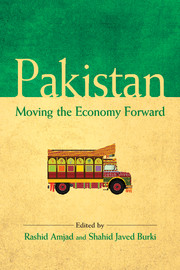Book contents
- Frontmatter
- Contents
- List of figures and tables
- Preface
- 1 Overview
- 2 Failed Economic Promise: Lessons from Pakistan's Development Experience
- 3 Economic Management Under IMF Tutelage: Key Lessons from the Musharraf and PPP Rule 1999–2013
- 4 A Country and an Economy in Transition
- 5 Tackling the Energy Crisis
- 6 Exports: Lessons from the Past and the Way Forward
- 7 The Future Path of Tax Reforms in Pakistan
- 8 Pakistan's Indus Basin Water Strategy: Past, Present and Future
- 9 Economic Governance and Institutional Reforms
- 10 Benefiting from Foreign Direct Investment
- 11 An Analysis of the Remittances Market in Pakistan
- 12 The Prospects for Indo-Pakistan Trade
- 13 Beyond the Poverty Line: A Multidimensional Analysis of Poverty in Pakistan
- 14 Can the New Intergovernmental Structure Work in Pakistan? Learning from China
- Contributors
- Index
4 - A Country and an Economy in Transition
Published online by Cambridge University Press: 05 May 2015
- Frontmatter
- Contents
- List of figures and tables
- Preface
- 1 Overview
- 2 Failed Economic Promise: Lessons from Pakistan's Development Experience
- 3 Economic Management Under IMF Tutelage: Key Lessons from the Musharraf and PPP Rule 1999–2013
- 4 A Country and an Economy in Transition
- 5 Tackling the Energy Crisis
- 6 Exports: Lessons from the Past and the Way Forward
- 7 The Future Path of Tax Reforms in Pakistan
- 8 Pakistan's Indus Basin Water Strategy: Past, Present and Future
- 9 Economic Governance and Institutional Reforms
- 10 Benefiting from Foreign Direct Investment
- 11 An Analysis of the Remittances Market in Pakistan
- 12 The Prospects for Indo-Pakistan Trade
- 13 Beyond the Poverty Line: A Multidimensional Analysis of Poverty in Pakistan
- 14 Can the New Intergovernmental Structure Work in Pakistan? Learning from China
- Contributors
- Index
Summary
Introduction
The main thrust of this chapter is that, in 2013, Pakistan is finally in a position to move forward and set its economy not only on the path to recovery, but also on a trajectory that will ensure high levels of sustainable growth. This could happen since some of structural problems that have dogged the political system since its creation seem to be nearing resolution. Since there is a close connection between political and economic developments, this advance in the former will have positive meaning for the latter. Pakistan may well be on its way to developing a new way of managing its affairs—meaning the way in which the political system is run, how the economy is managed, and how social interactions take place among different segments of the population. With the adoption of an appropriate set of public policies, it may also be possible to pull the economy out of the deep slump into which it has fallen and achieve a much higher rate of gross domestic product (GDP) growth.
This way of thinking about the future seems much too optimistic for a time that brings grim news every day—of an economy that is not able to move out of the slow growth groove in which it has been stuck since 2007; of national bankruptcy believed to be just around the corner; and of a country increasingly isolated in a world that is busy reorganizing itself. The GDP growth rate has been on a declining trend since the 1965 war with India. For the last six years, the average rate of growth has been just slightly more than 3 per cent a year— only one percentage point above the estimated yearly increase in population.
An unsettled economy and one in which many people fail to respect the rule of law creates costs that are borne largely by the poorer segments of the population.
- Type
- Chapter
- Information
- PakistanMoving the Economy Forward, pp. 84 - 107Publisher: Cambridge University PressPrint publication year: 2015



